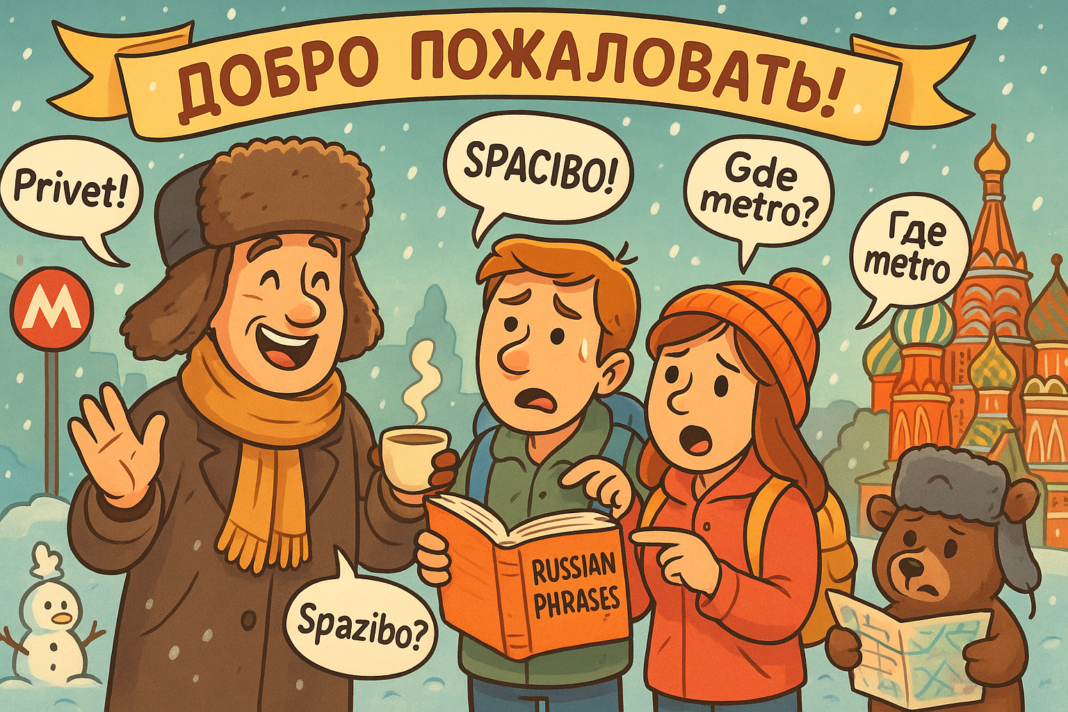“Privet!” — Hello 👋
If you’re planning a trip to Russia, learning a few basic Russian phrases can completely change your travel experience. Locals appreciate when visitors try to speak their language — it shows respect and curiosity for Russian culture and hospitality.
Whether you’re taking the metro in Moscow, visiting palaces in St. Petersburg, or skiing in Sochi, these common Russian words will help you greet, thank, order food, and find your way like a local.
👋 1. Privet (Привет) — “Hi / Hello”
Meaning: Friendly greeting (informal).
When to use: With people you meet casually — in cafes, shops, or hostels.
🗣 Example:
Tourist: Privet!
Local: Privet! Kak dela? (Hi! How are you?)
💡 For formal greetings, use Zdravstvuyte (Здравствуйте)
🤝 2. Zdravstvuyte (Здравствуйте) — “Hello (formal)”
Meaning: Respectful greeting for older people or strangers.
🗣 Example:
Tourist: Zdravstvuyte!
Local: Dobry den’! (Good day!)
🙏 3. Spasibo (Спасибо) — “Thank you”
Meaning: The most useful Russian word!
🗣 Example:
Waiter: Your coffee!
Tourist: Spasibo!
Waiter: Pozhaluysta (You’re welcome)
🌸 4. Pozhaluysta (Пожалуйста) — “You’re welcome / Please”
Meaning: Versatile word used in many contexts.
🗣 Example 1: Kofe, pozhaluysta (Coffee, please)
🗣 Example 2: Spasibo! – Pozhaluysta! (Thank you – You’re welcome)
🙂 5. Kak dela? (Как дела?) — “How are you?”
Meaning: Friendly way to start a conversation.
🗣 Example:
Local: Kak dela?
Tourist: Khorosho, spasibo! (I’m good, thank you!)
😄 6. Khorosho (Хорошо) — “Good / Fine”
🗣 Example:
Tourist: Kak dela?
Local: Khorosho!
❄️ 7. Da / Nyet (Да / Нет) — “Yes / No”
🗣 Example:
Vendor: Want souvenir?
Tourist: Da, skol’ko stoit? (Yes, how much?)
Or
Tourist: Nyet, spasibo! (No, thank you!)
🛒 8. Skol’ko stoit? (Сколько стоит?) — “How much does it cost?”
Meaning: Use it when shopping or haggling.
🗣 Example:
Tourist: Skol’ko stoit eto? (How much is this?)
Vendor: 500 rublei
🚇 9. Gde? (Где?) — “Where?”
Meaning: Ask for directions.
🗣 Example:
Tourist: Gde metro? (Where is the metro?)
Local: Tut! (Here!)
🚕 10. Taxi / Metro / Vokzal (Такси / Метро / Вокзал)
Meaning: Taxi / Metro / Train Station
🗣 Example:
Gde metro? – Where is the metro?
Vokzal daleko? – Is the train station far?
🍽 11. Menu, pozhaluysta (Меню, пожалуйста) — “Menu, please”
🗣 Example:
Tourist: Menu, pozhaluysta!
Waiter: Da, odnu minutu! (Yes, one moment!)
🍷 12. Odin / Dva (Один / Два) — “One / Two”
🗣 Example:
Odin kofe, pozhaluysta (One coffee, please)
Dva bilet, pozhaluysta (Two tickets, please)
💬 13. Ya ne ponimayu (Я не понимаю) — “I don’t understand”
🗣 Example:
Local: Skol’ko vam let?
Tourist: Ya ne ponimayu (I don’t understand)
💡 Use with a smile — locals will often switch to English.
🌍 14. Vy govorite po-angliyski? (Вы говорите по-английски?) — “Do you speak English?”
🗣 Example:
Tourist: Vy govorite po-angliyski?
Local: Nemnogo (A little)
🚶 15. Do svidaniya (До свидания) — “Goodbye”
🗣 Example:
Tourist: Do svidaniya!
Local: Udachi! (Good luck!)
🧭 Quick Cultural Tips for Tourists
🌟 Smile gently — Russians may seem serious but are warm once you connect.
🌟 Learn Cyrillic basics — Street signs become easier to read.
🌟 Bring cash — Some small shops prefer rubles.
🌟 Respect traditions — Take shoes off in homes, and avoid loud talk on public transport.
🌍 Why Learning Russian Phrases Matters
✅ Breaks the ice instantly
✅ Helps in local markets, taxis, and cafes
✅ Shows cultural respect
✅ Turns strangers into helpers
Even one “Spasibo” can warm a cold Moscow morning ❄️❤️
⚠️ Disclaimer
These phrases are shared for educational and cultural purposes. Pronunciations may vary across regions. Always speak politely and with a smile.

